6单元3a知识点
九年级上册英语第六单元3a知识点
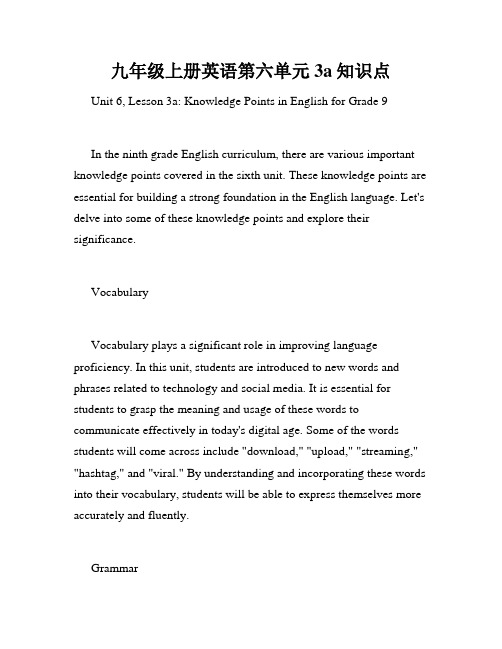
九年级上册英语第六单元3a知识点Unit 6, Lesson 3a: Knowledge Points in English for Grade 9In the ninth grade English curriculum, there are various important knowledge points covered in the sixth unit. These knowledge points are essential for building a strong foundation in the English language. Let's delve into some of these knowledge points and explore their significance.VocabularyVocabulary plays a significant role in improving language proficiency. In this unit, students are introduced to new words and phrases related to technology and social media. It is essential for students to grasp the meaning and usage of these words to communicate effectively in today's digital age. Some of the words students will come across include "download," "upload," "streaming," "hashtag," and "viral." By understanding and incorporating these words into their vocabulary, students will be able to express themselves more accurately and fluently.GrammarGrammar forms the backbone of any language. In this unit, students focus on several essential grammar concepts, including the present perfect tense and the use of adverbs. The present perfect tense is usedto talk about actions that started in the past and continue up to the present or have just finished. This tense helps students express experiences and events that have an impact on the present. Adverbs, on the other hand, provide more information about actions, describing how, when, or where they occur. By mastering these grammar concepts, students can enhance their ability to express themselves more precisely.Reading ComprehensionReading comprehension is a crucial skill in language learning, as it allows students to understand written information and extract meaning from texts. In this unit, students engage in various reading activities, such as true or false questions, multiple-choice questions, and filling in the blanks. These activities require students to comprehend the passage, identify key details, and make connections between different pieces of information. Through regular practice, students can develop their reading skills and improve their overall comprehension ability.Listening ComprehensionListening comprehension is another vital skill that students need to develop. This unit introduces students to audio clips or dialogues related to technology and social media. By actively listening and identifying specific information, students can enhance their ability to understand spoken English in various contexts. Listening activities help students improve their overall understanding of spoken language, including vocabulary, pronunciation, and intonation.Speaking and WritingEffective communication skills are essential in any language. In this unit, students have opportunities to practice speaking and writing about technology and social media. They engage in discussions, debates, and presentations, sharing their opinions and ideas on relevant topics. They also learn to express their thoughts in writing, such as composing opinions or summaries. These activities contribute to the development of critical thinking, creativity, and persuasive communication skills.ConclusionIn conclusion, the sixth unit of the ninth-grade English curriculum covers various knowledge points that are crucial for languagedevelopment. By focusing on vocabulary, grammar, reading comprehension, listening comprehension, speaking, and writing, students can enhance their language skills and become more proficient in English. These knowledge points not only promote effective communication but also provide students with the tools they need to navigate the modern world driven by technology and social media. With consistent practice and dedication, students can master these knowledge points and build a strong foundation for future language learning.。
人教版九年级英语全一册知识梳理第六单元《Unit 6 Section A》
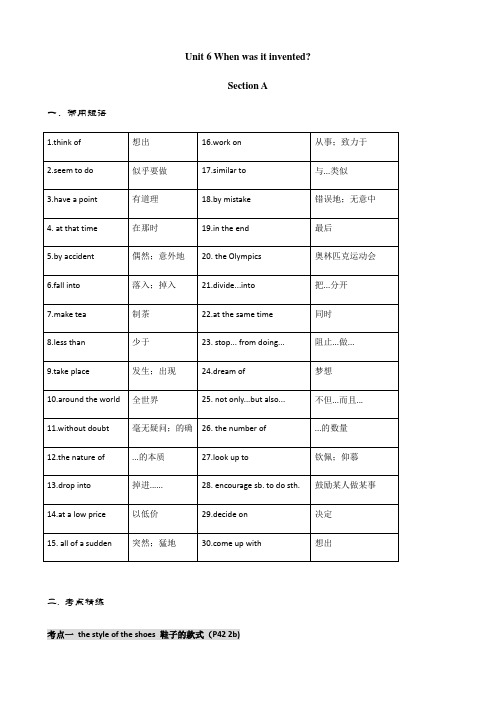
Unit 6 When was it invented?Section A一.常用短语二.考点精练考点一the style of the shoes 鞋子的款式(P42 2b)(1)style词性_________,意为__________。
常用短语in style意为“时髦的”,其反义短语为_____________,意为“过时的”。
名词/“样式;款式”/out of style☑ This year's style in dresses is different from last year's.今年的裙子样式与去年的不同。
☑ Her clothes are always in style.她的衣服总是很时髦。
(2)style 做名词,还可意为___________。
“方式”☑ Our children need new learning styles.我们的孩子需要新的学习方式。
考点二With pleasure! 非常愿意!(P42 2d)pleasure词性_________,意为___________。
名词/“高兴;愉快”☑ Watching the 2016 Summer Olympics gave him great pleasure.观看2016年夏季奥运会给他以极大的愉悦。
【辨析】with pleasure与my pleasure☑-Could you help me with my English?你能帮我学习英语吗?-With pleasure.当然可以。
☑ Thanks for helping me.谢谢你帮助了我。
-My pleasure./It's a pleasure.别客气。
考点三Think about how often it's used in our daily lives. 想想看,在我们的日常生活中它被使用得多么频繁。
(P42 2d)daily此处词性为_________,意为___________。
九年级英语六单元3a2d知识点
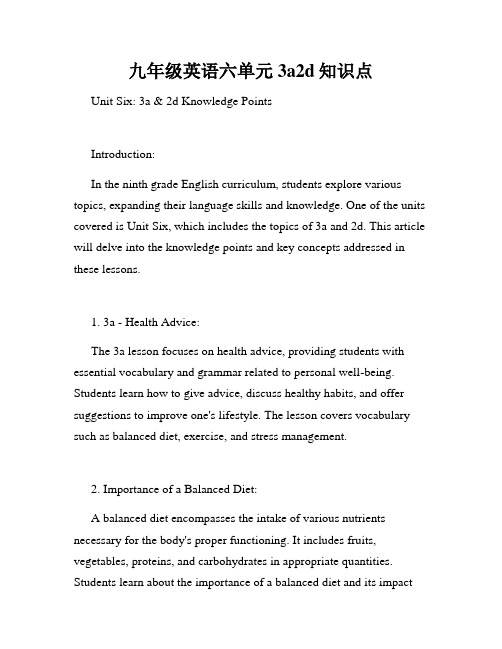
九年级英语六单元3a2d知识点Unit Six: 3a & 2d Knowledge PointsIntroduction:In the ninth grade English curriculum, students explore various topics, expanding their language skills and knowledge. One of the units covered is Unit Six, which includes the topics of 3a and 2d. This article will delve into the knowledge points and key concepts addressed in these lessons.1. 3a - Health Advice:The 3a lesson focuses on health advice, providing students with essential vocabulary and grammar related to personal well-being. Students learn how to give advice, discuss healthy habits, and offer suggestions to improve one's lifestyle. The lesson covers vocabulary such as balanced diet, exercise, and stress management.2. Importance of a Balanced Diet:A balanced diet encompasses the intake of various nutrients necessary for the body's proper functioning. It includes fruits, vegetables, proteins, and carbohydrates in appropriate quantities. Students learn about the importance of a balanced diet and its impacton physical and mental health. They are encouraged to discuss healthy eating habits and the benefits they provide.3. Exercise for a Healthy Lifestyle:Regular physical activity is crucial for maintaining a healthy lifestyle. Students engage in discussions on the benefits of exercise and its impact on overall well-being. They learn about different forms of exercise, such as running, swimming, and cycling, and understand how each contributes to physical fitness. Additionally, they discuss the importance of finding activities they enjoy to ensure regular exercise.4. Stress Management:In the 3a lesson, students also explore stress management techniques. They learn how stress can negatively affect their physical and mental health and discuss ways to alleviate stress. The lesson encourages students to engage in activities such as meditation, deep breathing exercises, and hobbies to reduce stress levels and improve overall well-being.5. 2d - School Rules and Advice:The 2d lesson focuses on school rules and advice, helping students understand the importance of a structured school environment. Studentslearn essential vocabulary related to school rules, such as uniform, punctuality, and discipline. They also discuss the reasons behind these rules and the benefits they provide to individuals and the entire school community.6. Importance of School Discipline:Students explore the significance of school discipline, understanding how it contributes to a positive learning environment. They discuss the role of discipline in maintaining order, fostering respect, and ensuring equal opportunities for all students. The lesson emphasizes the importance of adhering to rules and regulations for a successful educational experience.7. Punctuality and Time Management:Time management skills are crucial for academic success. Students learn about the importance of punctuality and how it affects their overall performance. They discuss strategies for effective time management, such as creating schedules, setting priorities, and avoiding procrastination. These discussions help students develop better habits and learn to manage their time efficiently.Conclusion:Unit Six, encompassing the lessons of 3a and 2d, provides ninth-grade English students with valuable knowledge and skills related to personal well-being and school rules. By understanding the importance of a balanced diet, exercise, stress management, as well as adhering to school rules and practicing punctuality, students can lead healthier and more disciplined lives. These topics contribute to the overall development and success of students, both within the school environment and beyond.。
人教版九年级英语第六单元Unit6 SectionA-3(3a-3c)

Tea has a long history.
▪ 神农尝百草的故事,在中国古代汉族神话传说及 《中国神话传说》中非常精彩。神农氏传说身体 透明,头上长有两角,即牛头人身。因为他的部 落居住在炎热的南方,称炎族,大家就称他为炎 帝。他见鸟儿衔种,由此发明了五谷农业。他看 到人们得病,又取瑶草而遇天帝赠神鞭。神农尝 百草多次中毒,都多亏了茶解毒。因誓言要尝遍 所有的草,最后因尝断肠草而逝世。人们为了纪 念他的恩德和功绩,奉他为药王神,并建药王庙 四时祭祀。在我国的川、鄂、陕交界传说是神农 尝百草的地方,称为神农架山区。
n. 饮料
What’s the most traditional drink in China?
What kinds of tea do you know?
1. Green tea
2. Black tea
3. Wu long tea 4. Compressed tea(砖茶) 5. Scented tea (花茶)
▪ 3. Alice is without doubt (怀疑) the best student in our class.
▪ 4. The dragon is treat as a national (民族 的)symbol of the Chinese.
▪ 5. Mother is boiling (煮沸) the milk for the baby.
▪ take place 发生;出现
▪ doubt /daut/ n. 疑惑;疑问 v. 怀疑
▪ without doubt 毫无疑问;的确
根据汉语提示完成单词。
▪ 1. The tiger is looked as the ruler (统治) of this forest.
九年级英语U6 A3a课文翻译与重难点讲解
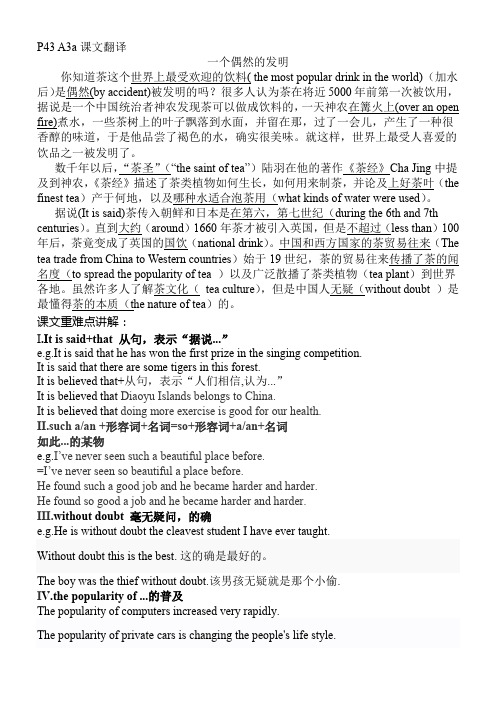
P43 A3a课文翻译一个偶然的发明你知道茶这个世界上最受欢迎的饮料( the most popular drink in the world)(加水后)是偶然(by accident)被发明的吗?很多人认为茶在将近5000年前第一次被饮用,据说是一个中国统治者神农发现茶可以做成饮料的,一天神农在篝火上(over an open fire)煮水,一些茶树上的叶子飘落到水面,并留在那,过了一会儿,产生了一种很香醇的味道,于是他品尝了褐色的水,确实很美味。
就这样,世界上最受人喜爱的饮品之一被发明了。
数千年以后,“茶圣”(“the saint of tea”)陆羽在他的著作《茶经》Cha Jing中提及到神农,《茶经》描述了茶类植物如何生长,如何用来制茶,并论及上好茶叶(the finest tea)产于何地,以及哪种水适合泡茶用(what kinds of water were used)。
据说(It is said)茶传入朝鲜和日本是在第六,第七世纪(during the 6th and 7th centuries)。
直到大约(around)1660年茶才被引入英国,但是不超过(less than)100年后,茶竟变成了英国的国饮(national drink)。
中国和西方国家的茶贸易往来(The tea trade from China to Western countries)始于19世纪,茶的贸易往来传播了茶的闻名度(to spread the popularity of tea )以及广泛散播了茶类植物(tea plant)到世界各地。
虽然许多人了解茶文化(tea culture),但是中国人无疑(without doubt )是最懂得茶的本质(the nature of tea)的。
课文重难点讲解:I.It is said+that 从句,表示“据说...”e.g.It is said that he has won the first prize in the singing competition.It is said that there are some tigers in this forest.It is believed that+从句,表示“人们相信,认为...”It is believed that Diaoyu Islands belongs to China.It is believed that doing more exercise is good for our health.II.such a/an +形容词+名词=so+形容词+a/an+名词如此...的某物e.g.I’ve never seen such a beautiful place before.=I’ve never seen so beautiful a place before.He found such a good job and he became harder and harder.He found so good a job and he became harder and harder.III.without doubt 毫无疑问,的确e.g.He is without doubt the cleavest student I have ever taught.Without doubt this is the best. 这的确是最好的。
八年级英语第六单元sectionA 3a 3c

The hightst mountain The most dangerous mountain The most popular place the most famous place The most beautiful mountain
用最高级来突出事物的特征
• Himalays [ˌhiməˈleiəz喜马拉雅山脉 ,藏语意为
“Qomolangma person”
珠峰达人
• Now challenge (挑战)youself ,you need to quickly and carefully finish these tasks ( 任务),the first student or group will be “Qomolangma person” (以小组为单位,第 一个举手的代表自己的小组回答问题,正 确的得一个旗帜。回答错误第二个举手的 同学获得回答的机会,旗帜最多的组为达 人)
延伸跨越… … 冰冻的天气 呼吸空气 第一个做某事
面临危险 放弃做某事 实现某人的梦
自然界的力量 到达顶峰 虽然;尽管
3a
Read the article and match each paragraph with the main ideas.
2 Read the article careful. And then write T (ture )or F(fale) (F ) 1.The Himalayas run along the northwestern part of China. ( F ) 3.The first woman to climb was Junko Tabei from Japan in 1953. (T )4.The spirit of these climbers shows us that we shouldn’t give up trying to achieve our dreams.
3A 1--6 单元重点单词和句型
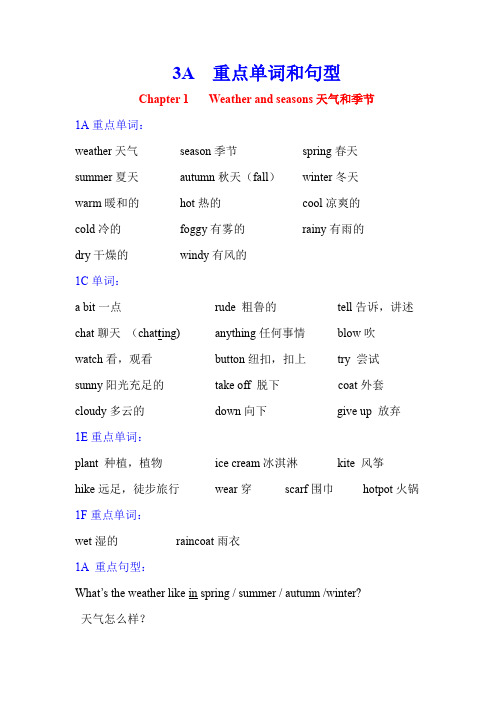
3A 重点单词和句型Chapter 1 Weather and seasons天气和季节1A重点单词:weather天气season季节s pring春天summer夏天autumn秋天(fall)winter冬天warm暖和的hot热的cool凉爽的cold冷的foggy有雾的rainy有雨的dry干燥的windy有风的1C单词:a bit一点rude 粗鲁的tell告诉,讲述chat聊天(chat t ing) anything任何事情blow吹watch看,观看button纽扣,扣上 try 尝试sunny阳光充足的take off 脱下coat外套cloudy多云的down向下give up 放弃1E重点单词:plant 种植,植物ice cream冰淇淋kite 风筝hike远足,徒步旅行wear穿scarf围巾hotpot火锅1F重点单词:wet湿的raincoat雨衣1A 重点句型:What’s the weather like in spring / summer / autumn /winter?天气怎么样?It’s warm and foggy(spring).(春天)天气暖和多雾。
It’s hot and rainy(summer).(夏天)天气热而且多雨。
It’s cool and dry(autumn).(秋天)凉爽而干燥。
It’s cold and windy(winter).(冬天)寒冷而风大。
1C句型:1.You are a bit rude. 你有一点没礼貌。
2.We don’t want to play with you. 我们不想和你玩。
3.Why don’t they want to play with me. 他们为什么不想跟我玩呢?4.I am strong. I can do anything. 我很强壮,我能做任何事情。
5.Can you see the man and the little girl down there?你能看见下面那个男人和那个小孩吗?6.Miss Sun smiles warmly at the people. 太阳小姐朝着人们温和地微笑。
最新人教版八下6单元 3a 译文和问题回答
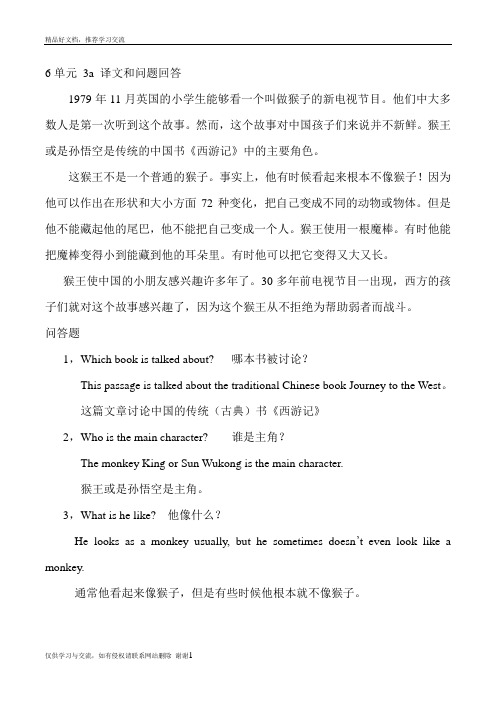
6单元3a 译文和问题回答
1979年11月英国的小学生能够看一个叫做猴子的新电视节目。
他们中大多数人是第一次听到这个故事。
然而,这个故事对中国孩子们来说并不新鲜。
猴王或是孙悟空是传统的中国书《西游记》中的主要角色。
这猴王不是一个普通的猴子。
事实上,他有时候看起来根本不像猴子!因为他可以作出在形状和大小方面72种变化,把自己变成不同的动物或物体。
但是他不能藏起他的尾巴,他不能把自己变成一个人。
猴王使用一根魔棒。
有时他能把魔棒变得小到能藏到他的耳朵里。
有时他可以把它变得又大又长。
猴王使中国的小朋友感兴趣许多年了。
30多年前电视节目一出现,西方的孩子们就对这个故事感兴趣了,因为这个猴王从不拒绝为帮助弱者而战斗。
问答题
1,Which book is talked about? 哪本书被讨论?
This passage is talked about the traditional Chinese book Journey to the West。
这篇文章讨论中国的传统(古典)书《西游记》
2,Who is the main character? 谁是主角?
The monkey King or Sun Wukong is the main character.
猴王或是孙悟空是主角。
3,What is he like? 他像什么?
He looks as a monkey usually, but he sometimes doesn’t even look like a monkey.
通常他看起来像猴子,但是有些时候他根本就不像猴子。
人教版英语九年级课件6单元A-3a

ttoKoreain6thcentury.
三、请翻译下列句子。
1.直到他明天回来我才能告诉他。 (until)_______________________________
who when
mention
describe
writer
discuss
ReadParagra ha
ph2
Jing
andfillinthem
ind-map
afew thousands yearslater
LuYu thesaint oftea
writer
Sheng Nong
howteapla ntsweregro
2.熟练掌握以下句型:
1.Didyouknowthatteawasinventedbyaccident? 2.It’ssaidthataChineserulercalledShenNongwasth
efirsttodiscoverteaasadrink.
3.It’sbelievedthatteawasbroughttoKoreaandJa panduringthe6thand7thcenturies. 4.Thefridgewassoldatalowprice. 5.Differentwriterstranslatedthebookintodifferent language.
二、语言功能: thestudentswilllearntousethepassivevoiceinthepa sttensetotalkaboutinventions.Bytalkingaboutone ofthefamousdrinkinventions--tea.
英语人教版九年级全册【教材分析】Unit6 sectionA(3a-3c)_英语
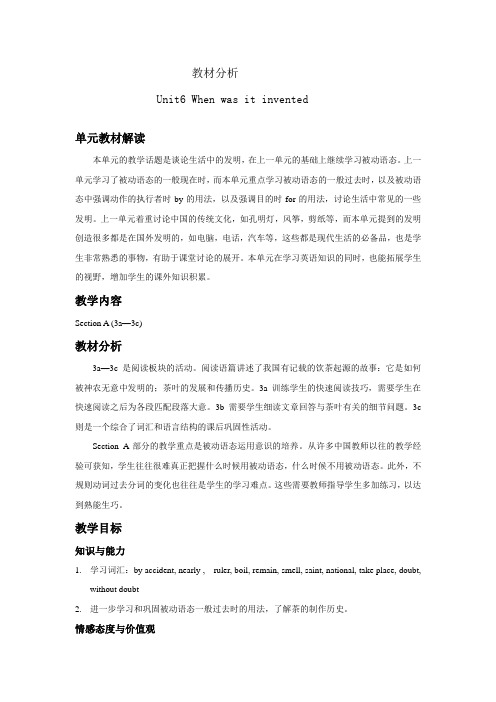
教材分析Unit6 When was it invented单元教材解读本单元的教学话题是谈论生活中的发明,在上一单元的基础上继续学习被动语态。
上一单元学习了被动语态的一般现在时,而本单元重点学习被动语态的一般过去时,以及被动语态中强调动作的执行者时by的用法,以及强调目的时for的用法,讨论生活中常见的一些发明。
上一单元着重讨论中国的传统文化,如孔明灯,风筝,剪纸等,而本单元提到的发明创造很多都是在国外发明的,如电脑,电话,汽车等,这些都是现代生活的必备品,也是学生非常熟悉的事物,有助于课堂讨论的展开。
本单元在学习英语知识的同时,也能拓展学生的视野,增加学生的课外知识积累。
教学内容Section A (3a—3c)教材分析3a—3c是阅读板块的活动。
阅读语篇讲述了我国有记载的饮茶起源的故事:它是如何被神农无意中发明的;茶叶的发展和传播历史。
3a训练学生的快速阅读技巧,需要学生在快速阅读之后为各段匹配段落大意。
3b需要学生细读文章回答与茶叶有关的细节问题。
3c 则是一个综合了词汇和语言结构的课后巩固性活动。
Section A部分的教学重点是被动语态运用意识的培养。
从许多中国教师以往的教学经验可获知,学生往往很难真正把握什么时候用被动语态,什么时候不用被动语态。
此外,不规则动词过去分词的变化也往往是学生的学习难点。
这些需要教师指导学生多加练习,以达到熟能生巧。
教学目标知识与能力1.学习词汇:by accident, nearly , ruler, boil, remain, smell, saint, national, take place, doubt,without doubt2.进一步学习和巩固被动语态一般过去时的用法,了解茶的制作历史。
情感态度与价值观1.使学生养成勤于观察,勤于思考的好习惯。
2.通过丰富的课堂活动,继续提升学生的团队协作精神3.鼓励学生保持对科学发明探索的兴趣。
教学重难点及突破教学重点:1.掌握词汇:by accident, nearly , ruler, boil, remain, smell, saint, national, take place, doubt, without doubt2.被动语态的学习和运用教学难点:运用一般过去时态的被动语态来讨论发明的发明时间及用途,弄清主动语态与被动语态的差异,通过练习和运用加以巩固。
九年级英语第六单元3a知识点
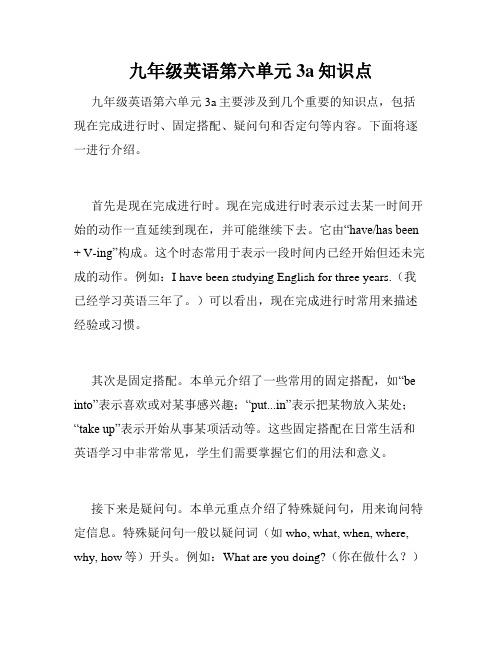
九年级英语第六单元3a知识点九年级英语第六单元3a主要涉及到几个重要的知识点,包括现在完成进行时、固定搭配、疑问句和否定句等内容。
下面将逐一进行介绍。
首先是现在完成进行时。
现在完成进行时表示过去某一时间开始的动作一直延续到现在,并可能继续下去。
它由“have/has been + V-ing”构成。
这个时态常用于表示一段时间内已经开始但还未完成的动作。
例如:I have been studying English for three years.(我已经学习英语三年了。
)可以看出,现在完成进行时常用来描述经验或习惯。
其次是固定搭配。
本单元介绍了一些常用的固定搭配,如“be into”表示喜欢或对某事感兴趣;“put...in”表示把某物放入某处;“take up”表示开始从事某项活动等。
这些固定搭配在日常生活和英语学习中非常常见,学生们需要掌握它们的用法和意义。
接下来是疑问句。
本单元重点介绍了特殊疑问句,用来询问特定信息。
特殊疑问句一般以疑问词(如who, what, when, where, why, how等)开头。
例如:What are you doing?(你在做什么?)特殊疑问句在交流中经常使用,因此学生们需要熟练掌握各种疑问词的用法,并能灵活运用。
最后是否定句。
在本单元的学习中,学生们需要注意否定句的构成。
一般情况下,在主系表结构中,我们将not置于be动词和主语之间。
例如:She is not eating dinner.(她没有吃晚饭。
)在其他动词后面直接加not即可构成否定句。
这个知识点虽然简单,但在实际应用中经常使用,需要学生们加以理解和掌握。
在学习九年级英语第六单元3a知识点的过程中,我们需要注意以下几点。
首先,要勤于复习和巩固所学的知识,通过做题和语言练习来强化记忆。
其次,要注重运用所学的知识,通过口语和写作的练习来提高语言表达能力。
最后,要善于总结和归纳,将所学的知识点进行整理和总结,形成自己的学习笔记,方便日后的回顾和温习。
九年级全一册英语第六单元3a翻译与知识点
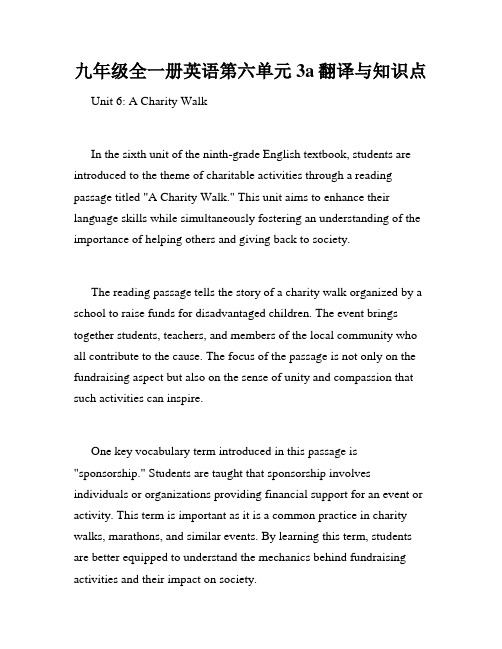
九年级全一册英语第六单元3a翻译与知识点Unit 6: A Charity WalkIn the sixth unit of the ninth-grade English textbook, students are introduced to the theme of charitable activities through a reading passage titled "A Charity Walk." This unit aims to enhance their language skills while simultaneously fostering an understanding of the importance of helping others and giving back to society.The reading passage tells the story of a charity walk organized by a school to raise funds for disadvantaged children. The event brings together students, teachers, and members of the local community who all contribute to the cause. The focus of the passage is not only on the fundraising aspect but also on the sense of unity and compassion that such activities can inspire.One key vocabulary term introduced in this passage is "sponsorship." Students are taught that sponsorship involves individuals or organizations providing financial support for an event or activity. This term is important as it is a common practice in charity walks, marathons, and similar events. By learning this term, students are better equipped to understand the mechanics behind fundraising activities and their impact on society.In addition to vocabulary, the passage supports students in developing their translation skills. The exercise titled "Translate the following sentences" challenges students to comprehend and translate sentences from Chinese to English. This exercise not only tests their language proficiency but also encourages them to think critically about language structure and usage.Alongside the translation task, students are presented with various short language points to further solidify their overall understanding of the passage. For instance, they learn about the use of the word "expect" in sentences like "She expects 5,000 people to join the walk." Through this example, students gain familiarity with the construction of sentences using "expect," an essential skill for both reading comprehension and writing.Furthermore, the reading passage introduces the concept of persuasive writing. Students are introduced to the idea of using persuasive language to encourage support and participation in charity events. Additionally, they learn about key persuasive techniques such as emotional appeals, logical reasoning, and the use of rhetorical questions. These skills go beyond simply understanding the passage and allow students to apply their knowledge to communicate effectively in real-life situations.To reinforce their understanding of the passage, students are given a writing task where they have to draft a persuasive letter inviting their friends and family to join a charity walk. This task challenges students to apply their language skills while also demonstrating their comprehension of persuasive techniques. By completing this task, students not only gain confidence in their writing abilities but also enhance their knowledge of charity events and the importance of actively engaging in community service.Overall, the sixth unit of the ninth-grade English textbook skillfully combines language learning with valuable knowledge on charity work. The reading passage, vocabulary exercises, translation tasks, and persuasive writing activities work in synergy to ensure students develop a thorough grasp of the topic. By engaging with these materials, students not only improve their language proficiency but also cultivate empathy, social awareness, and a desire to make a positive impact on society.。
人教版初中英语课标版 九年级第六单元Section A 3a(共11张PPT)-优课件

Para 3
Para 2
Intensive Reading
Para 1 -- Questions
1.Was the tea invented by accident? 2.When was tea first drunk? 3.Who was the first to discover the tea? 4.What was Shen Nong doing over an open fire? 5.How was tea invented?
Let's Make Tea !
1. Heating cups.(温具) 2. Setting tea.(置茶) 3. Washing tea.(洗茶) 4. Making tea.(冲泡) 5. Drinking and enjoying the tea.(品茶)
Hale Waihona Puke HowTtohmaakne ka cuypou ! of tea?
Unit 6
When was it invented?
An Accidental Invention
Section A-3a
Questions
1.What kind of tea do you know? 2.What do we use to drink tea? 3.Why do people drink tea? 4.How is tea produced?
这一 样个 的人 人所 才受 有的 学教 问育 。超
过 了 自 己 的 智 力 ,
You made my day!
我们,还在路上……
1.When was tea brought to other countries? 2.When did tea appear in England? 3.When did tea trade happen?
九年级英语全Unit6Whenwasitinvented单元词句梳理SectionA(3a

必背句子
14. Did you know that tea, the most popular drink in the world(after water),was invented by accident? 你知道茶,世界上最受欢迎的饮料 ( 仅次于水) 是偶然被发明的吗?
15. It is said that a Chinese ruler called Shen Nong was the first to discover tea as a drink.
谢谢观赏
You made my day!
Unit 6 When was it invented?
单元词句梳理 Section A(3a-3c)
必背单词
1. ruler n.统治者;支配者→ __r_u_l_e_ v. 统治 2. boil v.煮沸;烧开→ _b__o_il_in_g__ adj. 正在沸腾的→ _b_o_i_le_d_
据说有一位叫神农的中国统治者最早发现了茶可以饮用。
必背句子
16. In England, tea didn’t appear until around 1660. 在英国,茶直到1660 年才出现。
不习惯读书进修的人,常会自满于现状,觉得再没有什么事情需要学习,于是他们不进则退。经验丰富的人读书用两只眼睛,一只眼睛看到纸面上的话,另 一眼睛看到纸的背面。2022年4月27日星期三2022/4/272022/4/272022/4/27 书籍是屹立在时间的汪洋大海中的灯塔。2022年4月2022/4/272022/4/272022/4/274/27/2022 正确的略读可使人用很少的时间接触大量的文献,并挑选出有意义的部分。2022/4/272022/4/27April 27, 2022 书籍是屹立在时间的汪洋大海中的灯塔。
九年级英语第6单元3a知识点
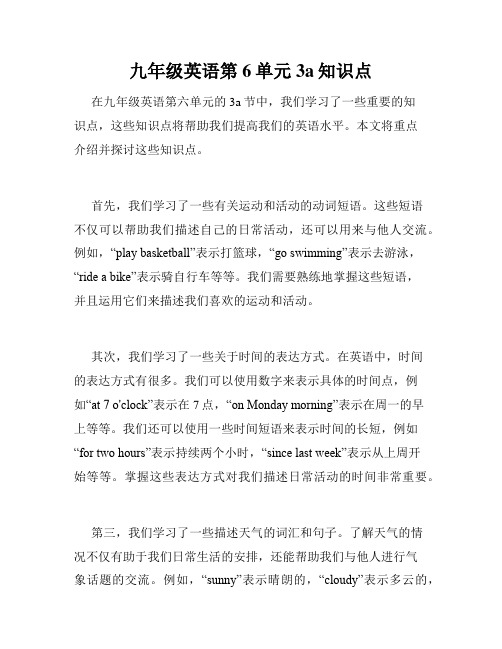
九年级英语第6单元3a知识点在九年级英语第六单元的3a节中,我们学习了一些重要的知识点,这些知识点将帮助我们提高我们的英语水平。
本文将重点介绍并探讨这些知识点。
首先,我们学习了一些有关运动和活动的动词短语。
这些短语不仅可以帮助我们描述自己的日常活动,还可以用来与他人交流。
例如,“play basketball”表示打篮球,“go swimming”表示去游泳,“ride a bike”表示骑自行车等等。
我们需要熟练地掌握这些短语,并且运用它们来描述我们喜欢的运动和活动。
其次,我们学习了一些关于时间的表达方式。
在英语中,时间的表达方式有很多。
我们可以使用数字来表示具体的时间点,例如“at 7 o'clock”表示在7点,“on Monday morning”表示在周一的早上等等。
我们还可以使用一些时间短语来表示时间的长短,例如“for two hours”表示持续两个小时,“since last week”表示从上周开始等等。
掌握这些表达方式对我们描述日常活动的时间非常重要。
第三,我们学习了一些描述天气的词汇和句子。
了解天气的情况不仅有助于我们日常生活的安排,还能帮助我们与他人进行气象话题的交流。
例如,“sunny”表示晴朗的,“cloudy”表示多云的,“rainy”表示有雨的等等。
我们还学会了一些句子,如“What's the weather like today?”(今天天气如何?)和“It's hot today.”(今天很热。
)等等。
熟练地运用这些词汇和句子将使我们的日常交流更加流利和自如。
最后,我们学习了一些关于健康和身体状况的形容词和词组。
保持良好的身体和健康对我们的生活至关重要。
因此,了解如何描述身体状况是非常有用的。
例如,“healthy”表示健康的,“sick”表示生病的,“tired”表示疲倦的等等。
我们还学会了一些词组,如“I have a headache.”(我头疼。
九年级英语6单元3a知识点
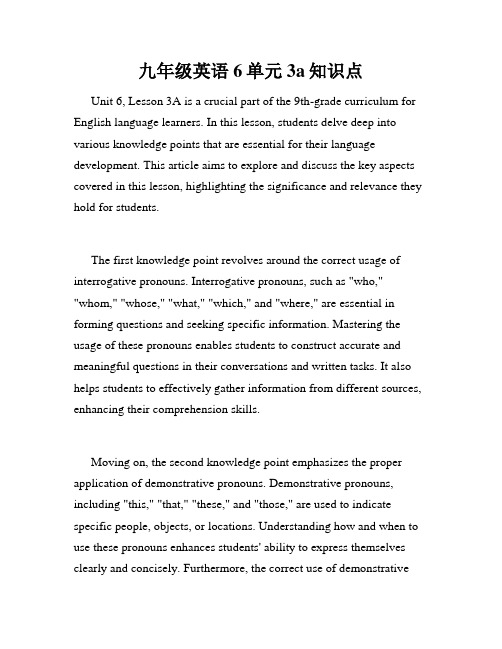
九年级英语6单元3a知识点Unit 6, Lesson 3A is a crucial part of the 9th-grade curriculum for English language learners. In this lesson, students delve deep into various knowledge points that are essential for their language development. This article aims to explore and discuss the key aspects covered in this lesson, highlighting the significance and relevance they hold for students.The first knowledge point revolves around the correct usage of interrogative pronouns. Interrogative pronouns, such as "who," "whom," "whose," "what," "which," and "where," are essential in forming questions and seeking specific information. Mastering the usage of these pronouns enables students to construct accurate and meaningful questions in their conversations and written tasks. It also helps students to effectively gather information from different sources, enhancing their comprehension skills.Moving on, the second knowledge point emphasizes the proper application of demonstrative pronouns. Demonstrative pronouns, including "this," "that," "these," and "those," are used to indicate specific people, objects, or locations. Understanding how and when to use these pronouns enhances students' ability to express themselves clearly and concisely. Furthermore, the correct use of demonstrativepronouns aids in developing cohesive and coherent writing, as it allows students to refer back to previously mentioned people or objects without repetition.The third knowledge point focuses on the skill of using possessive pronouns. Possessive pronouns, such as "mine," "yours," "his," "hers," "ours," and "theirs," demonstrate ownership or possession. By learning how to utilize possessive pronouns correctly, students can convey ownership, express ideas, and discuss relationships between people and objects. This ability strengthens their communication skills and enables them to express their thoughts and opinions accurately in various contexts.Furthermore, the fourth knowledge point in this lesson touches on the effective usage of relative pronouns. Relative pronouns, including "who," "whom," "whose," "which," and "that," are integral in forming relative clauses that provide additional information about a noun in a sentence. Familiarity with relative pronouns enables students to construct more complex and nuanced sentences. It allows them to add descriptive details, specify relationships, and create more varied sentence structures in their writing, thus elevating the quality and sophistication of their language usage.The final knowledge point emphasizes the importance of using reflexive pronouns appropriately. Reflexive pronouns, such as "myself," "yourself," "himself," "herself," "ourselves," and "themselves," reflect back to the grammatical subject of the sentence. Understanding the correct usage of reflexive pronouns aids in the clarity of expression, avoiding the ambiguity that arises from confused pronoun references. It also helps students to comprehend texts more accurately by recognizing reflexive pronouns and their function within a sentence.In conclusion, Unit 6, Lesson 3A of the 9th-grade English curriculum covers crucial knowledge points that enhance students' language proficiency. From interrogative pronouns to reflexive pronouns, each aspect plays a significant role in students' language development, allowing them to construct meaningful questions, convey ownership, add depth to their writing, and maintain grammatical clarity. Mastering these knowledge points empowers students to become more effective communicators and discerning readers, equipping them with essential skills for future language use.。
- 1、下载文档前请自行甄别文档内容的完整性,平台不提供额外的编辑、内容补充、找答案等附加服务。
- 2、"仅部分预览"的文档,不可在线预览部分如存在完整性等问题,可反馈申请退款(可完整预览的文档不适用该条件!)。
- 3、如文档侵犯您的权益,请联系客服反馈,我们会尽快为您处理(人工客服工作时间:9:00-18:30)。
8.第三段
• 28. It is believed that +从句 • 据认为/人们认为。。。 • 29. was brought to+地点 • 被带到某地 • 原形:bring • 30.during 在。。。期间 • 31. the 6th and 7th centuries • century 世纪;百年 (前面用序数词)
2
3.
• 9.discover tea • 发现茶(发现原本存在用discover) • 辨析:invent发明(大自然不存在发明创造) • 10.one day • 一天(过去时态或将来时态标志词) • 11.boil drinking water • 烧喝的(饮用的)水
3
4.
• 12.over an open fire • 在户外的火上 • 13. leaves from a tea plant • 叶子 一棵茶树上的 • 14.fell 原形:fall 落入 掉入 • 15. remain there for some time • 停留在那里 for(表持续时间)+ 一段时间
1.
• 1. an accidental invention • 一个偶然的发明 • an accidental invention • 2. , , • 插入语,补充说明作用 • 3.短语:by accident • 偶然地
1
2.
• 4.drunk 原形 :drink • 5. 一段时间5000 years + ago 。。。年前 • 6.It is said that • 据说(被动语态特殊用法) • 7. a Chinese ruler called XX • 过去分词做后置定语,名叫…的中国统治者 • 8.be the first to do sth. 第一个做…的人
15
• 3.arrive到达 • ring the bell 按门铃 ring rang rung • 4.tell sb. (not) to do sth. • 告诉某人(不要)做某事 • 违反规则break the rule ---broke broken • 开始做某事start doing • 吃饼干eat a biscuit • 5.the hungry kids 饥饿的孩子
4
5.
• 16. produce a nice smell • 产生一种好闻的气味 17.taste 品尝 • 18.quite = very= really相当;十分;非常 • 辨析:quiet 安静的;内向的 • 19.one of the 最高级 +名词(复数) • one of the world’s favorite drinks • 世界上最好的饮料之一---谓语动词用 单数
8
9.
• 32.England英格兰 • 33. tea didn’t appear until • not…until 直到。。。才出现 • 34.less than 少于,不到 • 原形:little 少----更少 less---最少least • 35.had become • 过去完成时:had+过去分词(从过去到过去) • 现在完成时:have/has +过去分词(过去到现
6
7.
• 24.were grown 被种植 • 25. be used to do sth.被用来做某事 • =be used for doing sth.被用来做某事 • used to do sth.过去常常做某事 • be/ get used to doing sth. 习惯做某事 • 26.fine 好-----最高级the finest • 27.kinds of 种类
在)
9
10.
• 36.the national drink • 全国性的饮品 • 37.the tea trade • 茶叶贸易 • 38.Western countries • 西方国家 • 39.took place • 原形:take p• 40.spead the popularity of tea • 传播茶的受欢迎,普及,流行度 • 41.把某物传播到某地 • spread sth. to +地点 • 42. around the world=all over the world • 43.even though即使,尽管 • 44. know about tea culture • 知道/了解 茶文化
5
6.
• 第二段 • 20. a few thousand years later • 几千年以后 • 21.the saint of tea • 茶圣 • 22.the book describes +宾语从句 • 书中描述了… • 23.It also discusses +宾语从句 它还讨论了
11
12
• 45.the Chinese中国人 +复数are • 46.without doubt毫无疑问 • 47.the ones • 这些人=those people • one 一个人、一件事 代词:泛指 • ones复数 这些人、这些事 • 48.who定语从句,先行词the ones 指人
14
• 4.translate … into… • 把…翻译成… • 4b • 2. all of a sudden突然 • luckily 幸运地 • good luck好运-----lucky幸运的----unlucky • village村庄---villager村民 • a safe place一个安全的地方
12
13
• 49.best understand 最好地理解 • understand… well • 50.the nature of tea • 茶的自然、本质
13
44页知识点
• 4a. • 1.sold 卖 原形:sell • the fridge冰箱 • at a low/high price以非常低/高的价格 • 2.steal --- stole----stolen • 3.advise sb. (not) to do sth. • 建议某人(不要)做某事 • go out alone 独自外出
